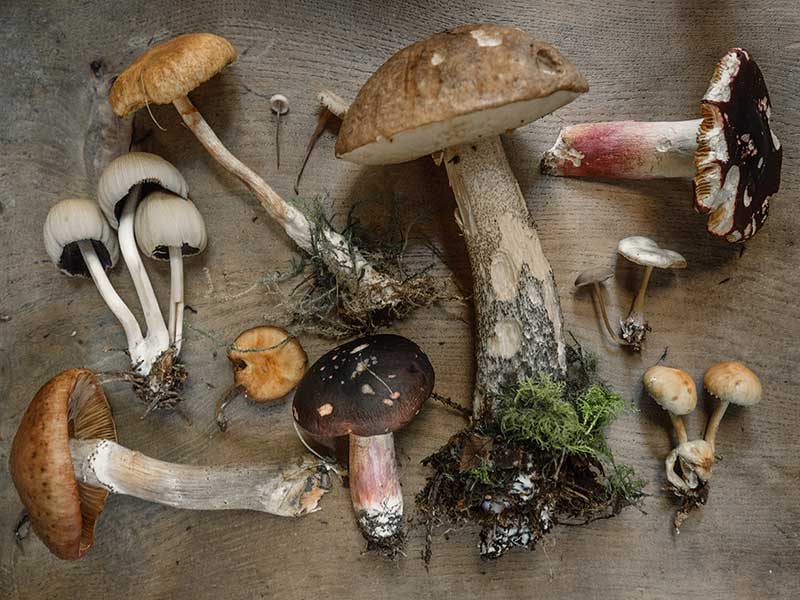Six Mushrooms to Help Keep Your Immunity In Check
Winter is a fun and magical season – but not for your immune system. After all, your immune system is what bears the brunt of winter’s wet and frigid weather, diminished daylight, and overexposure to stuffy indoor air.It works relentlessly this time of year to help protect you from infection, while faced with tremendous environmental, physical, and mental stressors that make you prone to infection and fatigue.
Instead of putting your immune system into overdrive and becoming worn out this season, look to your diet for added support. At Whole Earth & Sea, we know firsthand that raw, whole food nutrition is the best-supportive therapy for maintaining a strong immune system – and mushrooms are one of the biggest food-based contributors to immunity!

Mushrooms have a five-star nutrient profile and are recognized for over 100 medicinal functions, including impressive immune-enhancing and antioxidant properties.[1] The popularity of mushrooms is growing amongst scientists and health enthusiasts as research continues to unveil their numerous bioactive compounds. Here are six of the top mushrooms to support your immune system:
Reishi
The “mushroom of immortality,” most commonly known as reishi (Ganoderma lucidum), has been used in traditional Chinese medicine for thousands of years to improve health and longevity.[1] It is one of the most studied and widely used of all the medicinal mushrooms and a popular remedy for chronic illness in Asia. Over 30 years of clinical research has confirmed that reishi both activates and modulates the immune system. It also works with the body’s immune system cells to protect against oxidative damage and can be safely used for long periods of time.[1,2]
Maitake
Maitake (Grifolia frondosa) means “dancing mushroom” in Japanese. As an adaptogen, maitake increases the body’s resistance to stress. It is known to modulate the immune system and increase the activity of immune system cells, such as neutrophils and natural killer cells.[3] Early research has shown that maitake has antitumour activity, and researchers are studying whether it can be used with conventional cancer therapies.[4] Maitake also makes a delicious addition to soups and sauces because it contains a natural flavour enhancer called L-glutamate.
Shiitake
Shiitake (Lentinula edodes) is one of the most popular edible mushrooms with significant health benefits. It has been used for hundreds of years to relieve symptoms of the common cold and has both antioxidant and antimicrobial activities. Current research is focused on shiitake’s benefits for suppressed immune function, allergies, cardiovascular health, recurrent colds and flu, as well as numerous chronic health conditions.[5]
Cordyceps
The “caterpillar fungus” called cordyceps (Cordyceps sinensis) is found at high altitudes in the Himalayan mountains. Traditional healers use this unique fungus that lives on certain caterpillars, for its adaptogenic properties that enhance vigour and vitality, and reduce fatigue.[6, 7] Preliminary evidence also shows that cordyceps has a protective effect on the body’s organs and a sedative effect on the central nervous system.[1, 6]
Chaga
Chaga (Inonotus obliquus) is a slow-growing fungus found in cold habitats. It has been used as a folk medicine in Russia and Eastern Europe for over 400 years where it is recognized for its superior antioxidant activity and ability to combat oxidative stress.[8, 9] Chaga contains a wide variety of phenolic compounds believed to stimulate the immune system.[8]
Lion’s mane
Lion’s mane (Hericium erinaceus) is an edible mushroom with a long history of use in Chinese medicine for fatigue and general debility.[10]It is also recognized for improving mood and brain function. A placebo-controlled clinical trial found that patients who took lion’s mane were able to lower their feelings of anxiety and irritation, while improving their concentration.[11]

Making the most of mushrooms’ benefits
Many edible mushrooms have outstanding nutritional profiles and immune-supportive properties. If you’re feeling overwhelmed and not sure how to incorporate mushrooms into your diet, there’s a simple one-per-day solution. Pure Food Super Mushroom from Whole Earth & Sea® contains a blend of six organic mushrooms, Wellmune® beta glucan, and our nutrient-dense Farm Fresh Factors™ to create a vital bioenergetic immune and energy support formula. Its synergistic combination of maitake, shiitake, reishi, cordyceps, chaga, and lion’s mane mushrooms provides a well-rounded profile of mycelia and fungal polysaccharides used in herbal medicine to support immune function, increased energy, and resistance to stress.
Wellmune is a beta 1,3/1,6 glucan sourced from a highly purified strain of baker’s yeast (Saccharomyces cerevisiae). Just like the beta glucans found in mushrooms, Wellmune can bind to the body’s immune cell receptors. It has been shown to help alleviate symptoms of upper respiratory tract infections (URTIs) and increase energy in clinical trial participants.[12]
Beta glucans – the secret behind mushrooms’ benefits
One of the biggest reasons for mushrooms’ immune-boosting properties is a group of compounds called beta glucans. These are the main types of polysaccharides (long-chain carbohydrates) found in mushrooms, making up half the mass in their cell walls.[1]
Beta glucans are not made by our bodies, but they can trigger both our innate and adaptive immune responses.[1] They do this by binding to and activating the receptors found on white blood cells, including macrophages, neutrophils, natural killer cells, and cytotoxic T-cells, which help the body respond to infection.[12]
A long history of immune support
When it comes to immune support, mushrooms have stood the test of time. They gave strength to Ancient Greek warriors, were the “food of the gods” for Romans, and are treasured as an “elixir of life” in traditional Chinese culture.[1] Whether you want to increase your energy and stamina to cope with an active lifestyle, are seeking adrenal support for mental stress, or are looking to strengthen your immunity as well as make it through the cold and flu season unscathed, mushrooms have a lot to offer – both as a food and a natural health product.
References:
- Valverde ME, Hernández-Pérez T, Paredes-López O. Edible mushrooms: improving human health and promoting quality life. Int J Microbiol. 2015; 376387.
- Lin ZB. Cellular and molecular mechanisms of immuno-modulation by Ganoderma lucidum. J Pharmacol Sci. 2005; 99(2):144-53.
- Ulbricht C, Weissner W, Basch E, et al. Maitake mushroom (Grifola frondosa): systematic review by the natural standard research collaboration. J Soc Integr. 2009; 7(2):66-72.
- Deng G, Lin H, Seidman A, et al. A phase I/II trial of a polysaccharide extract from Grifola frondosa (Maitake mushroom) in breast cancer patients: immunological effects. J Cancer Res Clin Oncol. 2009; 135(9):1215-21.
- Bisen PS, Baghel RK, Sanodiya BS. Lentinus edodes: a macrofungus with pharmacological activities. Curr Med Chem. 2010; 17(22):2419-30.
- Zhou X, Gong Z, Su Y, et al. Cordyceps fungi: natural products, pharmacological functions and developmental products. J Pharm Pharmacol. 2009; 61(3):279-91.
- Nagata A, Tajima T, Uchida M. Supplemental anti-fatigue effects of Cordyceps sinensis Tochu-Kaso extract powder during three stepwise exercise of human. Jpn J Phys Fitness Sports Med. 2006; 55:S145-52.
- Najafzadeh M, Reynolds PD, Baumgartner A, et al. Chaga mushroom extract inhibits oxidative DNA damage in lymphocytes of patients with inflammatory bowel disease. Biofactors. 2007; 31(3-4):191-200.
- Zheng WF, Zhao YY, Zhang MM, et al. Phenolic compounds from Inonotus obliquus and their immune-stimulating effects. Mycosystema. 2008; 27(4):574-81.
- Thongbai B, Rapior S, Hyde KD, et al. Hericium erinaceus, an amazing medicinal mushroom. Mycological Progress. 2015; 14:91.
- Nagano M, Shimizu K, Kondo R, et al. Reduction of depression and anxiety by 4 weeks Hericium erinaceus intake. Biomed Res. 2010; 31(4):231-7.
- Talbott S, Talbott J. Beta 1,3/1,6 Glucan decreases upper respiratory tract infection symptoms and improves psychological well-being in moderate to highly-stressed subjects. Agro Food Industry Hi-Tech. 2010; 21(1):21-4.
.png)